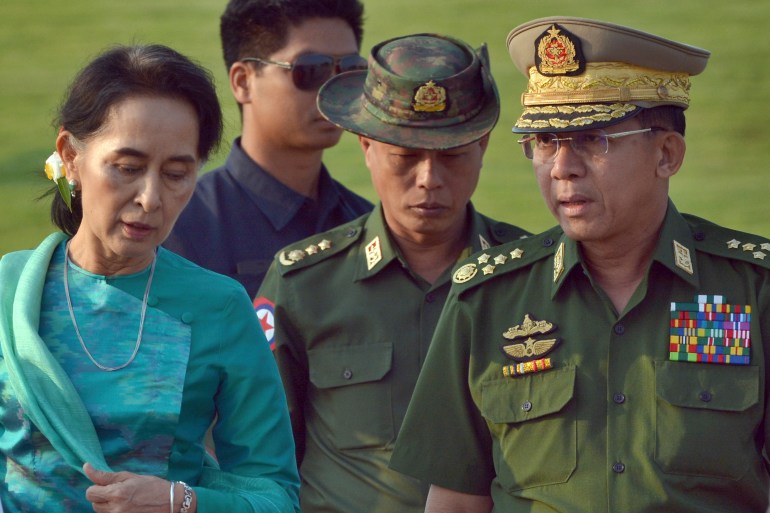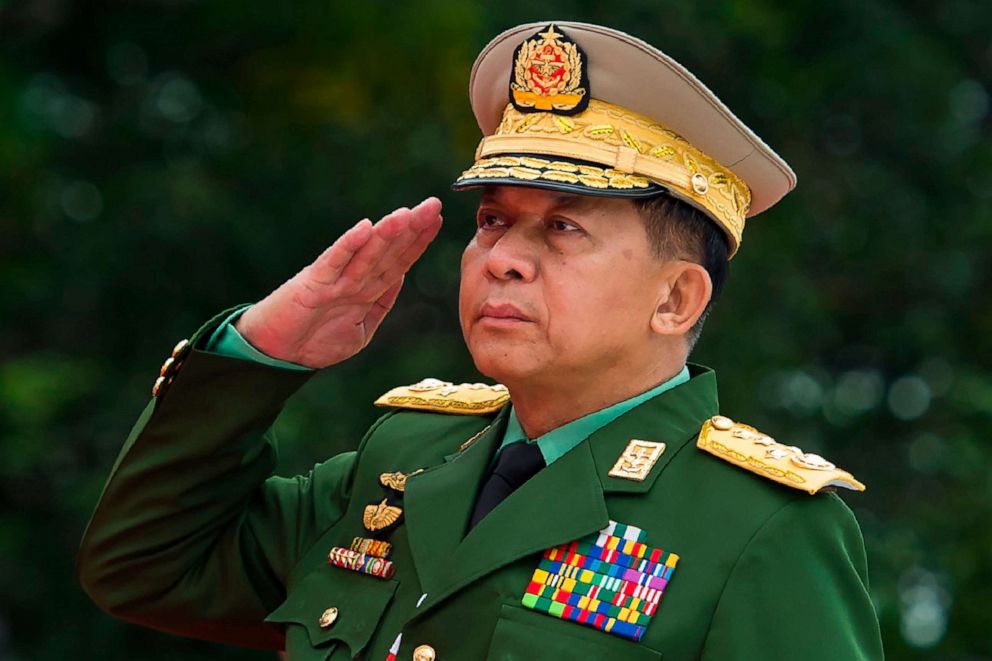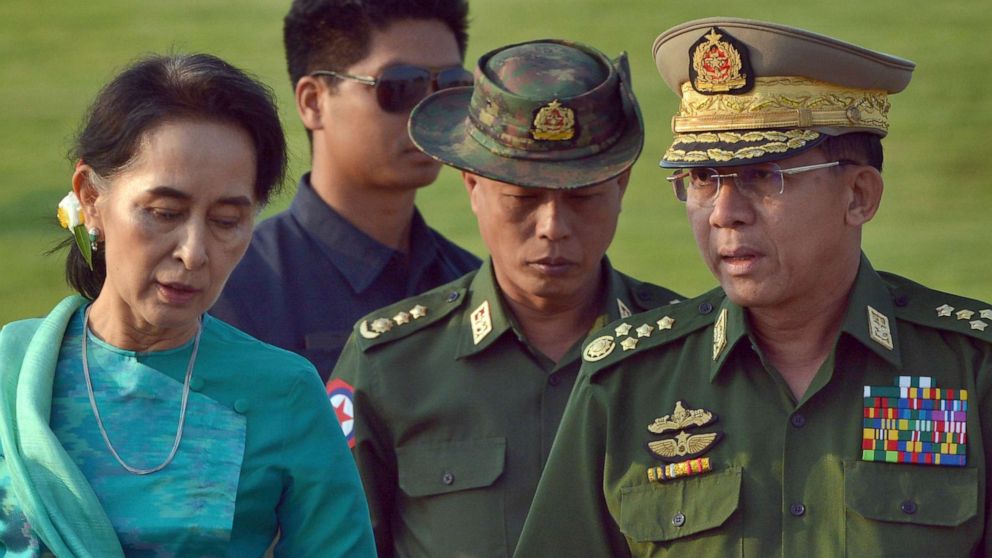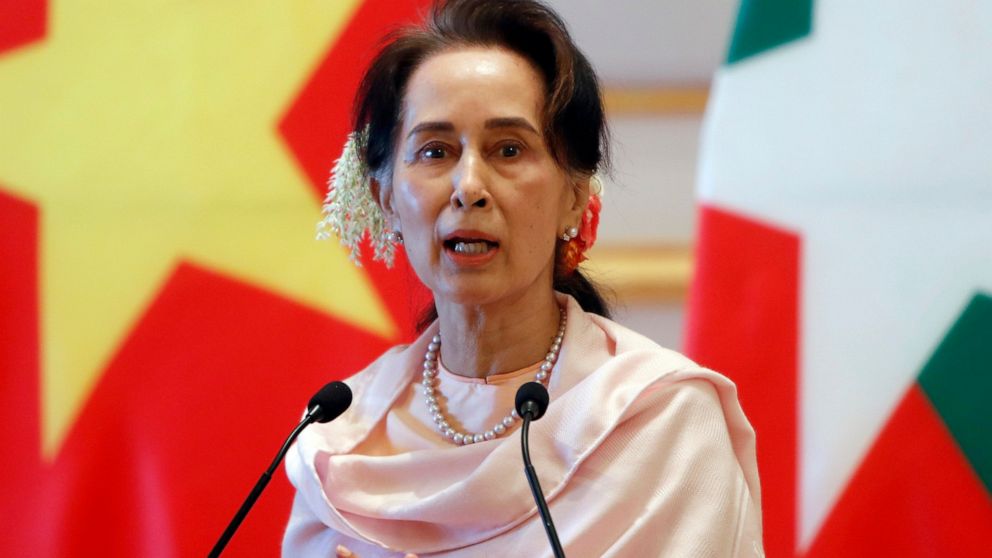Military declares state of emergency claiming fraud in election, after early morning raids detaining senior members of elected government.

Myanmar state TV said on Monday that the military was taking control of the country for one year, while reports said many of the country’s senior politicians including Suu Kyi had been detained [File: Aung Shine Oo/AP]
31 Jan 2021
Myanmar’s military has taken power and declared a state of emergency after detaining civilian leader Aung San Suu Kyi and other senior government officials in a series of early morning raids that followed days of escalating tension over the outcome of the November election, which the ruling party won by a landslide.
A video address broadcast on military-owned television said power had been handed to the commander-in-chief of the armed forces, Senior General Min Aung Hlaing. The emergency will remain in force for a year, it said.
KEEP READING
In Myanmar’s Rakhine, families of the disappeared seek answers
Myo Nyunt, the spokesman for the governing National League for Democracy (NLD) said earlier on Monday, that Aung San Suu Kyi, President Win Myint and other leaders had been “taken” in the early hours of the morning.
Later on Monday, the NLD said Aung San Suu Kyi called on the public not to accept the coup and to protest.
“The actions of the military are actions to put the country back under a dictatorship,” the NLD said in a statement which carried leader Aung San Suu Kyi’s name. “I urge people not to accept this, to respond and wholeheartedly to protest against the coup by the military.”
Myanmar’s Parliament, where the military is given a quarter of seats and wields more power through its proxy Union Solidarity and Development Party (USDP), was due to open in the country’s capital Naypyidaw from Monday.

Myo Nyunt, the spokesman for the governing National League for Democracy (NLD) said earlier on Monday, that Aung San Suu Kyi, President Win Myint and other leaders had been “taken” in the early hours of the morning.
Later on Monday, the NLD said Aung San Suu Kyi called on the public not to accept the coup and to protest.
“The actions of the military are actions to put the country back under a dictatorship,” the NLD said in a statement which carried leader Aung San Suu Kyi’s name. “I urge people not to accept this, to respond and wholeheartedly to protest against the coup by the military.”
Myanmar’s Parliament, where the military is given a quarter of seats and wields more power through its proxy Union Solidarity and Development Party (USDP), was due to open in the country’s capital Naypyidaw from Monday.

Myanmar leader Aung San Suu Kyi and other senior government officials were detained by the government in an early morning series of raids on Monday, the day the new parliament was supposed to sit [File: Aung Shine Oo/Reuters]Politicians from states and regions, as well as prominent political activists were also detained, while mobile and phone networks were seeing disruption. State media was also taken off-air.
Monday’s developments drew immediate condemnation.
UN Secretary-General Antonio Guterres said the developments were a “serious blow to democratic reforms” and urged all leaders to refrain from violence and respect human rights, a UN spokesman said.
“We call on Burmese military leaders to release all government officials and civil society leaders and respect the will of the people of Burma as expressed in democratic elections on November 8,” US Secretary of State Antony Blinken said in a statement.
Australia said it was “deeply concerned” at the situation, as did India.
“India has always been steadfast in its support to the process of democratic transition in Myanmar,” a statement from the foreign ministry said. “We believe that the rule of law and the democratic process must be upheld. We are monitoring the situation closely.”
Questioning election
The NLD won November’s elections by a landslide, but the military has been waging a months-long campaign to discredit the outcome, despite no firm evidence of wrongdoing.
The Supreme Court is currently considering its claims, but the situation escalated last week when Min Aung Hlaing threatened to abolish the constitution. On Saturday, the military, also known as the Tatmadaw, appeared to backtrack saying media had taken the general’s comments out of context.
“The Tatmadaw will defend the 2008 Constitution and only act within the boundary of existing laws,” it said.
“The people of Myanmar had their say in November’s vote, and overwhelmingly sent the message that they reject army rule,” said Charles Santiago, the chair of ASEAN Parliamentarians for Human Rights and a Malaysian MP. “The military must respect the will of the people and allow parliament to proceed.”
Santiago urged the Association of Southeast Asian Nations, of which Myanmar is a member, to “immediately use all its diplomatic power to de-escalate the situation and allow democracy to prevail.”
Singapore’s Foreign Ministry expressed “grave concern” at events and urged all parties to exercise restraint and work towards a positive and peaceful outcome. Thailand, Cambodia and the Philippines all shied away from criticism saying the military takeover was Myanmar’s internal affair. All four countries are members of ASEAN.
Amid the rising political uncertainty, people in Yangon, the country’s biggest city and commercial capital, had begun flying the NLD’s red flag from their balconies in solidarity with the governing party, while banners had also been erected in the streets declaring support for the elected government.

Monday’s developments drew immediate condemnation.
UN Secretary-General Antonio Guterres said the developments were a “serious blow to democratic reforms” and urged all leaders to refrain from violence and respect human rights, a UN spokesman said.
“We call on Burmese military leaders to release all government officials and civil society leaders and respect the will of the people of Burma as expressed in democratic elections on November 8,” US Secretary of State Antony Blinken said in a statement.
Australia said it was “deeply concerned” at the situation, as did India.
“India has always been steadfast in its support to the process of democratic transition in Myanmar,” a statement from the foreign ministry said. “We believe that the rule of law and the democratic process must be upheld. We are monitoring the situation closely.”
Questioning election
The NLD won November’s elections by a landslide, but the military has been waging a months-long campaign to discredit the outcome, despite no firm evidence of wrongdoing.
The Supreme Court is currently considering its claims, but the situation escalated last week when Min Aung Hlaing threatened to abolish the constitution. On Saturday, the military, also known as the Tatmadaw, appeared to backtrack saying media had taken the general’s comments out of context.
“The Tatmadaw will defend the 2008 Constitution and only act within the boundary of existing laws,” it said.
“The people of Myanmar had their say in November’s vote, and overwhelmingly sent the message that they reject army rule,” said Charles Santiago, the chair of ASEAN Parliamentarians for Human Rights and a Malaysian MP. “The military must respect the will of the people and allow parliament to proceed.”
Santiago urged the Association of Southeast Asian Nations, of which Myanmar is a member, to “immediately use all its diplomatic power to de-escalate the situation and allow democracy to prevail.”
Singapore’s Foreign Ministry expressed “grave concern” at events and urged all parties to exercise restraint and work towards a positive and peaceful outcome. Thailand, Cambodia and the Philippines all shied away from criticism saying the military takeover was Myanmar’s internal affair. All four countries are members of ASEAN.
Amid the rising political uncertainty, people in Yangon, the country’s biggest city and commercial capital, had begun flying the NLD’s red flag from their balconies in solidarity with the governing party, while banners had also been erected in the streets declaring support for the elected government.

A banner erected in support of Aung San Suu Ky and the elected government in Yangon. The new parliament was due to sit on Monday [Thein Zaw/AP Photo]

Military supporters holding the Myanmar national flags march in a protest against the election commission [Lynn Bo Bo/EPA]On the streets many places were closed but street markets were packed with people buying supplies like rice, eggs, and vegetables. The city remained relatively quiet and calm, but many were alarmed by the developments.
A 25-year-old woman who works at a packing company declined to be named said the network disruption meant she was unable to contact her family in eastern Shan State.
“I’m very worried about my family and I cannot even go back to my hometown [because of COVID restrictions],” she said.
“This is not good, I’m worried about what it will mean. Things will get bad. People will probably protest and I honestly don’t know what will happen next.”
The last week has been marked by rival protests in support of the NLD and the armed forces.
“It’s at a critical juncture,” said Damien Kingsbury, a Myanmar expert at Deakin University in Australia. “It’s either the end of military involvement in Myanmar politics or it’s a coup. There’s no middle ground on this. This is crunch time.”
Myanmar, once a British colony, was led by the military for decades before it began a transition to democracy in 2008.
Aung San Suu Kyi is the only daughter of national independence hero Aung San, and spent years under the house arrest during the military regime.
With reporting by Andrew Nachemson in Yangon.
A 25-year-old woman who works at a packing company declined to be named said the network disruption meant she was unable to contact her family in eastern Shan State.
“I’m very worried about my family and I cannot even go back to my hometown [because of COVID restrictions],” she said.
“This is not good, I’m worried about what it will mean. Things will get bad. People will probably protest and I honestly don’t know what will happen next.”
The last week has been marked by rival protests in support of the NLD and the armed forces.
“It’s at a critical juncture,” said Damien Kingsbury, a Myanmar expert at Deakin University in Australia. “It’s either the end of military involvement in Myanmar politics or it’s a coup. There’s no middle ground on this. This is crunch time.”
Myanmar, once a British colony, was led by the military for decades before it began a transition to democracy in 2008.
Aung San Suu Kyi is the only daughter of national independence hero Aung San, and spent years under the house arrest during the military regime.
With reporting by Andrew Nachemson in Yangon.
Menendez calls for U.S. sanctions against Myanmar after military coup

U.S. Sen. Bob Menendez. (Photo: Kevin Sanders for New Jersey Globe)
By David Wildstein, January 31 2021
U.S. Senator Bob Menendez, who is about to assume the chairmanship of the Senate Foreign Relations Committee, tonight condemned the detention of Myanmar head of state Daw Aung San Suu Kyi after a military coup on Sunday.
“The launch of another coup would be a tragedy for the people of Burma after a decade of work to establish a civilian-led democratic government,” Menendez said. “The Tatmadaw, who are guilty of genocide against the Rohingya and of a sustained campaign of violence against Burma’s ethnic minorities, must immediately free the democratic leaders of Myanmar and remove themselves from government.”
Menendez said that if the Tatmadaw, the Myanmar armed forces, do not release government officials being held, the U.S. and other nations “should impose strict economic sanctions, as well as other measures, against the Tatmadaw and the military leadership of Burma.:
“I look forward to working with President Biden and Senators Schumer and McConnell to take immediate action and stand with the people of Burma in the face of military oppression,” Menendez said.
Myanmar army seizes power in apparent coup, declares state of emergency
Aung San Suu Kyi along with members of her party were detained by the military.
ByKarson Yiu
31 January 2021
Myanmar’s army seized power in an apparent coup during the early morning hours Monday, detaining de facto leader Aung San Suu Kyi along with members of her party and declared a state of emergency for at least one year, signaling an end to the Southeast Asian nation's nascent democratic experiment.
A newsreader on the military-owned Myawaddy TV confirmed the coup hours later, citing fraud in the country’s elections this past November, which Suu Kyi’s party National League for Democracy (NLD) won in a landslide.
Nobel Peace Prize winner Suu Kyi, still revered in her country despite losing some of her international luster for her refusal to condemn the Myanmar army’s atrocities against the Rohingya Muslim minority, is understood to have had a tentative shared power agreement with the military since she came to power in 2015, offering the government a veneer of democratic legitimacy as they embarked on a decade of reforms.
MORE: 3 years later, US pressed to declare Rohingya crisis 'genocide,' hold Myanmar accountable
The election was meant to be a referendum on Nobel Laureate Suu Kyi’s popular civilian government but they expanded their seats in the parliament threatening the military's tight hold on power. The new civilian-led government was meant to have convened for the first time on Monday.

Ye Aung Thu/AFP via Getty Images
(FILES) In this file photo taken on July 19, 2018, Myanmar's Chief Senior General Min Aung Hlain...
Power has now been handed over to the commander-in-chief of the armed forces, Senior General Min Aung Hlaing, who is already under U.S. sanctions for his role in the human rights abuses against the Rohingyas.
The military previously ruled this Southeast Asia nation, also known as Burma, for nearly five decades before appearing to slowly transition to democratic rule a decade ago and holding its first general elections in years in 2015 and again this past November.
U.S. Secretary of State Antony Blinken quickly said the “military must reverse these actions immediately” and “to release all government officials and civil society leaders and respect the will of the people of Burma as expressed in democratic elections on November 8. The United States stands with the people of Burma in their aspirations for democracy, freedom, peace, and development.”
NLD spokesman Myo Nyunt confirmed to Reuters Suu Kyi, Myanmar President Win Myint and other NLD leaders were “taken” in the early hours of the morning, adding that he expected to be arrested himself. Reuters reported that it subsequently was unable to contact him.
The state-run Radio and Television (MRTV) announced on its social media page that it was no longer working on Monday morning. There were also reports of phones and internet being cut in the capital city of Nay Pyi Taw and in some parts of the commercial center of Yangon.
The U.S. embassy in Myanmar urged U.S. citizens there to “avoid unnecessary travel, monitor local media, and avoid large gatherings.”

Aung Shine Oo/AP
FILE - In this May 6, 2016, file photo, Aung San Suu Kyi, left, Myanmar's foreign minister, walks w...
Signs of an impending coup were building in the last couple of weeks as a military spokesperson said on Jan. 26 that he did not rule out the possibility of a coup when asked about it at a media conference. The next day, the now-newly installed leader Min Aung Hlaing said in a speech at a military academy that "if the constitution is not followed, then it should be declared invalid.”
Nikkei Asia reported that according to military sources, the military and the government held talks in Nay Pyi Taw as late as Jan. 28 in an attempt to reach common ground but ultimately failed to come to an agreement.
MORE: Rohingya refugees say they would choose death over repatriation to Myanmar
Local reports said the military expressed concerns about the electoral commission and demanded a recount of the votes and a postponement of Monday’s opening of the parliament, but Suu Kyi’s government refused.
Myanmar historian and celebrated author Thant Myin-U warned of an ominous near future for his home in a tweet, “The doors just opened to a very different future. I have a sinking feeling that no one will really be able to control what comes next. And remember Myanmar’s a country awash in weapons, with deep divisions across ethnic and religious lines, where millions can barely feed themselves.”
Military takes control of Myanmar; Suu Kyi reported detained
Military takes control of Myanmar; Suu Kyi reported detained
Myanmar military television says the military is taking control of the country for one year, while reports say many of the country’s senior politicians including Aung San Suu Kyi have been detained
By The Associated Press
31 January 2021

The Associated Press
FILE - In this Dec. 17, 2019, file photo, Myanmar's leader Aung San Suu Kyi speaks during a joint...
NAYPYITAW, Myanmar -- Myanmar military television said Monday that the military was taking control of the country for one year, while reports said many of the country’s senior politicians including Aung San Suu Kyi had been detained.
A presenter on military-owned Myawaddy TV announced the takeover and cited a section of the military-drafted constitution that allows the military to take control in times of national emergency. He said the reason for takeover was in part due to the government’s failure to act on the military’s claims of voter fraud in last November’s election and its failure to postpone the election because of the coronavirus crisis.
The announcement and the declaration of a state of emergency follows days of concern about the threat of a military coup — and military denials that it would stage one — and came on the morning the country’s new Parliament session was to begin.
The takeover is a sharp reversal of the partial yet significant progress toward democracy Myanmar made in recent years following five decades of military rule and international isolation that began in 1962. It would also be shocking fall from power for Suu Kyi, who led the democracy struggle despite years under house arrest and and won a Nobel Peace Prize for her efforts.
Suu Kyi's National League for Democracy released a statement on the Facebook page of its party head saying the military’s actions were unjustified and went against the constitution and the will of voters. The statement urged people to oppose Monday’s “coup” and any return to “military dictatorship.”
It was not possible to confirm who posted the message as NLD members were not answering phone calls.
The military's actions were already receiving widespread international condemnation.
New U.S. Secretary of State Anthony Blinken issued a statement expressing “grave concern and alarm” over the reported detentions.
“We call on Burmese military leaders to release all government officials and civil society leaders and respect the will of the people of Burma as expressed in democratic elections,” he wrote, using Myanmar's former name. “The United States stands with the people of Burma in their aspirations for democracy, freedom, peace, and development.”
The office of the U.N. secretary-general was also among those to issue a statement condemning the developments as a “serious blow to democratic reforms.”
The detention of the politicians and cuts in television signals and communication services on Monday were the first signs that plans to seize power were in motion. Phone and internet access to Naypyitaw was lost and Suu Kyi’s party could not be reached. Phone service in other parts of the country was also reported down, though people were still able to use the internet in many areas.
The Irrawaddy, an established online news service, reported that Suu Kyi, who as state counsellor is the nation’s top leader, and the country’s president, Win Myint, were both detained in the pre-dawn hours. The news service cited Myo Nyunt, a spokesman for the NLD.
Its report said that the party’s Central Executive Committee members, lawmakers and regional Cabinet members had also been taken into custody.
A list of other people believed to have been detained, compiled by political activists who asked not to be named for security reasons, included filmmaker Min Htin Ko Ko Gyi, writer Maung Thar Cho, and prominent veterans of the country's 1988 student protest movement, such as Ko Ko Gyi and Min Ko Naing. Their detention could not immediately be confirmed.
The military TV report said Commander-in-Chief Senior Gen. Min Aung Hlaing would be in charge of the country, while Vice President Myint Swe would be elevated to acting president. Myint Swe is a former general best known for leading a brutal crackdown on Buddhist monks in 2007. He is a close ally of former junta leader Than Shwe.
As word of the military’s actions spread in Yangon, the country’s biggest city, there was a growing sense of unease among residents who earlier in the day had still been packed into cafes for breakfast and had been doing their morning shopping.
People were removing the bright red flags of Suu Kyi’s party that once adorned their homes and businesses. Lines formed at ATMs as people waited to take out cash, efforts that were being complicated by internet disruptions. Workers at some businesses decided to go home.
Monday's parliamentary session was to be the first since last year’s election, as tension lingered over recent comments by the military that were widely seen as threatening a coup.
The military, however, maintains its actions are legally justified, though Suu Kyi's party spokesman as well as many international observers have said it is in effect a coup.
The 2008 constitution, drafted and implemented during military rule, has a clause that says in case there is a national emergency, the president in coordination with the military-dominated National Defense and Security Council can issue an emergency decree to hand over the government’s executive, legislative and judicial powers to the military’s commander-in-chief.
The clause had been described by New York-based Human Rights Watch as a “coup mechanism in waiting.”
It is just one of many parts of the charter that ensured the military could maintain ultimate control over the country at the expense elected politicians. The military also was guaranteed 25% of seats in Parliament and control of several key ministries, especially those involved in security and defense.
The 75-year-old Suu Kyi is by far the country’s most popular politician, and became the country’s de facto leader after her party won 2015 elections, though the constitution barred her from being president. She had been a fierce antagonist of the army during her time under house arrest.
Nevertheless, once in power Suu Kyi had to balance her relationship with the country's generals and even went on the international stage to defend their crackdown on Rohingya Muslims in the country's west, a campaign the U.S. and others have labeled genocide. That has left her reputation internationally in tatters.
She remains wildly popular at home, where most supported the campaign against the Rohingya. Suu Kyi’s party captured 396 out of 476 seats in the combined lower and upper houses of Parliament in last November’s polls.
The military, known as the Tatmadaw, has charged that there was massive voting fraud in the election, though it has failed to provide proof. The state Union Election Commission last week rejected its allegations.
Amid the bickering over the allegations, the military last Tuesday ramped up political tension when a spokesman at its weekly news conference, responding to a reporter’s question, declined to rule out the possibility of a coup. Maj. Gen. Zaw Min Tun elaborated by saying the military would “follow the laws in accordance with the constitution.”
Using similar language, the military chief told senior officers in a speech Wednesday that the constitution could be revoked if the laws were not being properly enforced. Adding to the concern was the unusual deployment of armored vehicles in the streets of several large cities.
On Saturday and Sunday, however, the military denied it had threatened a coup, accusing unnamed organizations and media of misrepresenting its position.
No comments:
Post a Comment